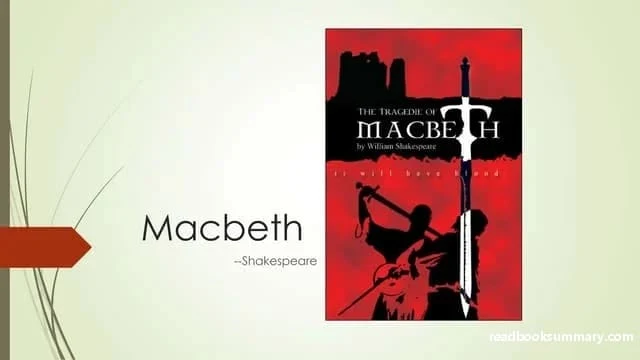Macbeth Play Summary, ( full title The Tragedie of Macbeth) it is a tragedy by William Shakespeare. It is thought to have been first performed in 1606. It dramatises the damaging physical and psychological effects of political ambition on those who seek power.
Of all the plays that Shakespeare wrote during the reign of James I, Macbeth most clearly reflects his relationship with King James, patron of Shakespeare's acting company. It was first published in the Folio of 1623, possibly from a prompt book, and is Shakespeare's shortest tragedy.
 |
| Macbeth Summary |
Macbeth Summary
Set in medieval Scotland and partly based on a true historical account, Macbeth charts the bloody rise to power and tragic downfall of the warrior Macbeth. Already a successful soldier in the army of King Duncan, Macbeth is informed by Three Witches that he is to become king.
As part of the same prophecy, the Witches predict that future Scottish kings will be descended not from Macbeth but from his fellow army captain, Banquo. Although initially prepared to wait for Fate to take its course, Macbeth is stung by ambition and confusion when King Duncan nominates his son Malcolm as his heir.
Returning to his castle, Macbeth allows himself to be persuaded and directed by his ambitious wife, who realizes that regicide — the murder of the king — is the quickest way to achieve the destiny that her husband has been promised. A perfect opportunity presents itself when King Duncan pays a royal visit to Macbeth's castle.
At first Macbeth is loth to commit a crime that he knows will invite judgment, if not on earth then in heaven. Once more, however, his wife prevails upon him. Following an evening of revelry, Lady Macbeth drugs the guards of the king's bedchamber; then, at a given signal, Macbeth, although filled with misgivings, ascends to the king's room and murders him while he sleeps.
Haunted by what he has done, Macbeth is once more reprimanded by his wife, whose inner strength seems only to have been increased by the treacherous killing. Suddenly, both are alarmed by a loud knocking at the castle door.
When the drunken porter of Macbeth's castle finally responds to the noise, he opens the door to Macduff, a loyal follower of the king, who has been asked to awake Duncan in preparation for the return journey. Macbeth indicates the location of the king's room, and Macduff discovers the body.
When the murder is revealed, Macbeth swiftly kills the prime witnesses, the sleepy guards of the king's bedchamber, and Lady Macbeth faints. The assembled lords of Scotland, including Macbeth, swear to avenge the murder. With suspicion heavy in the air, the king's two sons flee the country: Donalbain to Ireland and Malcolm to raise an army in England.
Macbeth is duly proclaimed the new king of Scotland, but recalling the Witches' second prophecy, he arranges the murder of his fellow soldier Banquo and his son Fleance, both of whom represent a threat to his kingship according to the Witches' prophecy.
The hired murderers kill Banquo but mistakenly allow Fleance to escape. At a celebratory banquet that night, Macbeth is thrown into a state of horror when the ghost of the murdered Banquo appears at the dining table. Again, his wife tries to strengthen Macbeth, but the strain is clearly beginning to show.
The following day, Macbeth returns to the same Witches who initially foretold his destiny. This time, the Witches not only confirm that the sons of Banquo will rule in Scotland, but they also add a new prophecy: Macbeth will be invincible in battle until the time when the forest of Birnam moves towards his stronghold at Dunsinane and until he meets an enemy "not born of woman." Dismissing both of these predictions as nonsense, Macbeth prepares for invasion.
When he is told that Macduff has deserted him, Macbeth begins the final stage of his tragic descent. His first move is the destruction of Macduff's wife and children. In England, Macduff receives the news at the very moment that he swears his allegiance to the young Malcolm. Malcolm persuades him that the murder of his family should act as the spur to revenge.
Meanwhile, in Scotland, Lady Macbeth has been taken ill: She walks in her sleep and seems to recall, in fragmentary memories, the details of the murder. Now, in a series of alternating scenes, the action of the play moves rapidly between the advancing army of Malcolm and the defensive preparations of Macbeth.
When Malcolm's army disguise themselves with sawn-off branches, Macbeth sees what appears to be a wood moving towards his stronghold at Dunsinane. And when he finally meets Macduff in single combat, his sworn enemy reveals that he came into the world by cesarean section; he was not, precisely speaking, "born of woman.
" On hearing this news, Macbeth rejects one final time the Witches' prophecy. With a loud cry, he launches himself at Macduff and is slain. In the final scene, Malcolm is crowned as the new king of Scotland, to the acclaim of all.
You may also like to read: Othello Book Summary
 |
| Macbeth Plot Summary |
 |
| Macbeth Synopsis |
 |
| Macbeth Shakespeare Summary |
Questions about Macbeth Plot
What is the main point of Macbeth? The main theme of Macbeth —the destruction wrought when ambition goes unchecked by moral constraints—finds its most powerful expression in the play's two main characters. Macbeth is a courageous Scottish general who is not naturally inclined to commit evil deeds, yet he deeply desires power and advancement.
What is the Short summary of Macbeth ending? At the end of the play, Macbeth's severed head is brought to Malcolm by Macduff, proof that Macbeth has been overthrown, and that Scotland is now Malcom's to rule. Malcolm promises rewards to all who have fought for him, and names them all earls, the first in Scotland.
What is the theory of Macbeth? According to folklore, Macbeth was cursed from the beginning. A coven of witches objected to Shakespeare using real incantations, so they put a curse on the play. Legend has it the play's first performance (around 1606) was riddled with disaster.
Why Macbeth is a tragedy? Tragedy. Macbeth represents a classic tragedy in that its protagonist travels down a dark path of treachery and violence that inevitably leads to his own downfall and death. Like the protagonists in other classic tragedies, Macbeth is a politically noteworthy figure.
What is irony in Macbeth? An example of dramatic irony is Duncan thanking Lady Macbeth for her hospitality because the audience knows that Lady Macbeth wants Macbeth to murder King Duncan, so when Duncan thanks her for her hospitality, it is dramatic irony because the audience knows what her true intentions are.
Who kills Macbeth? Seven years later, on 15 August 1057, he was killed at the Battle of Lumphanan in Aberdeenshire by Duncan's eldest son, Malcolm Canmore.
What are Macbeth's last words? It is too late, he drags me down; I sink, I sink, — my soul is lost forever.
How is Macbeth finally killed? During the final battle, Macbeth is beheaded by Macduff. The play ends with Macduff carrying Macbeth's head onstage and declaring that order has been restored to the kingdom.
Why is the ending of Macbeth ironic? In Macbeth Story, we see this with the prophecies of the witches. Macbeth is led to believe that he will be king and nobody can murder him or take him from the throne. When we reach the ending of the novel, we understand that the prophecies did come true, just not in the way we expect them to.
Is Macbeth Based on a true story? Shakespeare's famous tragedy Macbeth is based upon his life, but is not historically accurate. In the play, Macbeth and his wife murder the aged King Duncan when he comes to visit them in their castle. In reality, Macbeth killed Duncan, who was about 39, in battle, and made himself king instead.
What does Macbeth mean? 1. a tragedy (1606?) by Shakespeare. 2. its title character, who, goaded by his ruthlessly ambitious wife, murders the king to gain the crown for himself.
Why did Shakespeare write Macbeth? Shakespeare wrote Macbeth as a tribute to King James I, who became king a few years before the play was first performed. Shakespeare also wanted to caution against abuses of power and the instability which follows from political violence.
What is the conflict in Macbeth? Conflict Within, Macbeth struggles with the decision to murder for personal gain; ambition motivates him to commit the unthinkable. He kills Duncan, and wallows in guilt afterward. His conscience takes over, paranoia sets in, and the repercussions are endless.
What happens to Lady Macbeth? After Macbeth becomes a murderous tyrant, she is driven to madness by guilt over their crimes and kills herself offstage.
Is Macbeth a tragic hero? Macbeth is considered a tragedy, and Macbeth is the tragic hero as he displays a tragic flaw that leads to his destruction. A tragic hero is someone of noble birth who displays some characteristics of good. The tragic flaw they display leads to their death.
Why is Macbeth so famous? Macbeth is one of Shakespeare's most famous tragic heroes, not least because he represents the Man Who Has It All (seemingly) and yet throws it away because of his 'vaulting ambition' to have Even More: to be king.
